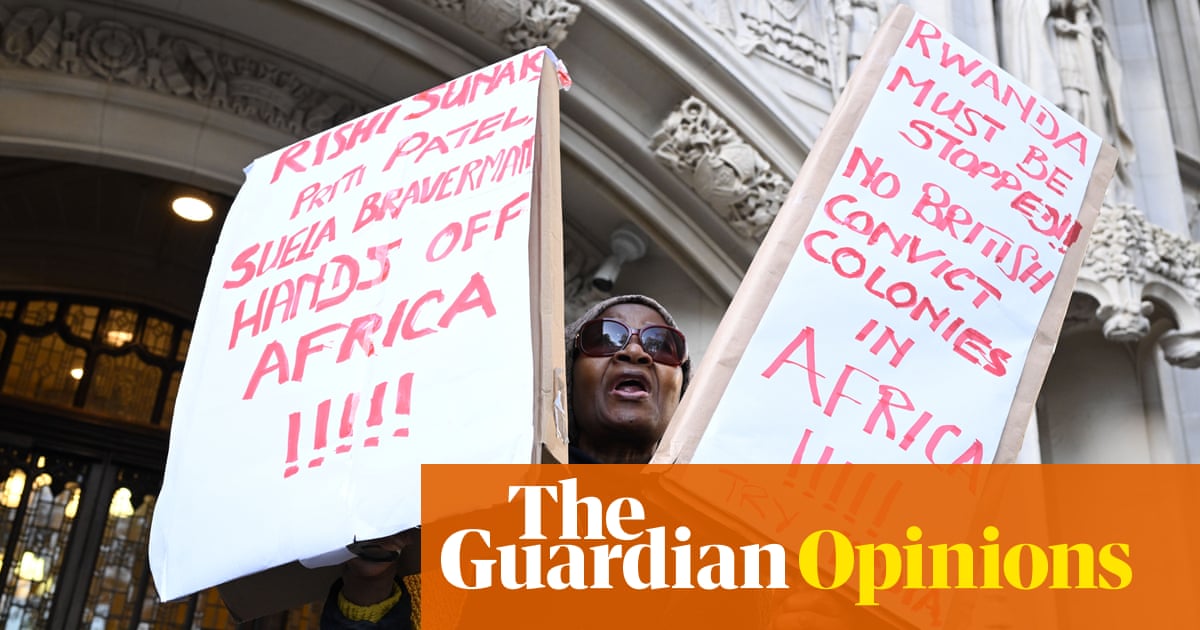
The supreme court’s unanimous decision to rule the Rwanda asylum deal unlawful is humiliating for the government. Not only for its immigration policy, but for the whole Conservative project from Boris Johnson to Rishi Sunak, which has combined contempt for human rights with breathtaking incompetence. The policy is not just morally objectionable but stupid.
The issue before the court today was, at heart, a simple one. Does the UK have the right to place refugees – people who have fled war, persecution, torture or worse – at risk of being sent back to the countries they fled? The judges were clear: no, it does not. Contrary to what you might read in the rightwing press, this isn’t only because of the European convention on human rights or its UK counterpart, the Human Rights Act. The judges stressed that a whole set of international treaties, including the UN Refugee Convention, as well as multiple UK laws on asylum and immigration, prohibit the practice, which is known officially as refoulement (the act of forcing a refugee to return to a place from which he or she is seeking asylum).
The government tried to claim that there was no risk of refoulement in its Rwanda deal. It said that Rwanda, which would take responsibility for processing people’s asylum claims, could be trusted to give asylum-seekers a fair hearing – and not to send them back to countries where their lives were at risk. The British and Rwandan governments had signed a “memorandum of understanding”, a non-legally binding document, in which Rwanda promised to treat people fairly. And if that wasn’t enough, there were “financial incentives”, not least a £140m bung to the Rwandan government, to make sure it complied, along with a “monitoring” arrangement.
The supreme court disagreed. The UN’s refugee agency, UNHCR, had submitted compelling evidence on behalf of the asylum-seekers challenging the policy, raising serious concerns about safety in Rwanda. The country has a poor human rights record in general. Rwanda’s asylum system has a history of poor decision-making, wrongly rejecting refugees from some of the world’s most dangerous war zones. And if you want to know how an asylum deal like the one the UK signed might pan out, there’s the example of the deal Rwanda signed with Israel in 2013. Hundreds, if not thousands, of asylum seekers, deported from Israel to Rwanda, were quietly expelled to a neighbouring country without being allowed to claim asylum.
The supreme court agreed with the UNHCR. There were substantial grounds for believing asylum-seekers would be at risk of refoulement if the UK sent them to Rwanda, and so judges ruled the policy unlawful.
But here’s the thing. The British government knew about these risks from the moment that a plan to deport asylum seekers to a “safe third country” – as a way of deterring small boats Channel crossings – was cooked up by Downing Street and the Home Office, all the way back in the autumn of 2020. Rwanda, according to a September 2020 diplomatic telegram from the British embassy in Kigali, had a poor “human rights story”; opposition activists had been disappeared or killed. “Our recommendation … would be not to pursue Rwanda as an option,” the embassy had warned in early 2021.
But the government was desperate to sign a deal. No 10 repeatedly asked the Foreign Office, which had been tasked with finding likely partners, to reconsider Rwanda. Eventually the Foreign Office conceded. The deal that was subsequently struck – along with the memorandum of understanding, a promise to help Rwanda bring its asylum system up to scratch – has been exposed as nothing more than a fig leaf. Even after it was signed, the British government bungled the execution. By setting a tight deadline for the first deportation flight to Kigali – which was scheduled for 14 June 2022 – ministers pushed the Home Office to rush through the arrangements, with civil servants scrambling to complete casework and find vital services such as interpreters as the clock ticked down. Under the weight of appeals from asylum seekers selected for deportation, the flight never took off.
The Rwanda policy is a shambles. It has made life hell for the people who have been threatened with deportation – as several have told me – and does nothing to create the fair and humane system the UK sorely needs. But it must also be seen as part of a wider pattern.
The Johnson and Sunak governments have repeatedly sought to alter the basic protections that keep individuals safe from abuse by the state – or which offer them redress when harm is done. They have not only undermined the right to asylum. They have restricted the right to protest, passed laws shielding soldiers, state agents and officials from punishment, and banned victims of crimes committed during the Northern Ireland Troubles from seeking justice.
If left unaltered, these changes – and the inflammatory political rhetoric that has accompanied them – will have an impact that far outlasts the life of the current government. Universal human rights are supposed to be universal for a reason: chip away at them and it puts everyone at risk.
For now, attention is likely to focus on the internal psychodrama of the Conservative party. Will Sunak seek to ignore the court’s ruling, or bring new legislation – or, perhaps, strike a deal with another “safe” third country that can be less easily challenged? All have been suggested in recent briefings to the media. Will Suella Braverman and her allies on the hard right make withdrawing from the European convention on human rights the central plank of their pitch for leadership of the party, either now or after the next election? Possibly.
As this is fought out over the coming weeks, however, remember one thing. The chaos is the product of everyone who’s had their hands on the machinery of government since 2019, not just one individual or faction. It is a joint enterprise of the Conservative party. They are, to paraphrase our new foreign secretary, all in it together.
Daniel Trilling is the author of Lights in the Distance: Exile and Refuge at the Borders of Europe and Bloody Nasty People: the Rise of Britain’s Far Right











